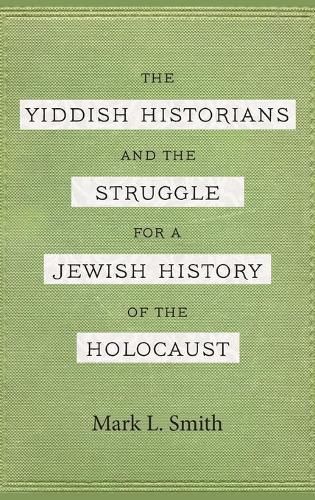Readings Newsletter
Become a Readings Member to make your shopping experience even easier.
Sign in or sign up for free!
You’re not far away from qualifying for FREE standard shipping within Australia
You’ve qualified for FREE standard shipping within Australia
The cart is loading…






This title is printed to order. This book may have been self-published. If so, we cannot guarantee the quality of the content. In the main most books will have gone through the editing process however some may not. We therefore suggest that you be aware of this before ordering this book. If in doubt check either the author or publisher’s details as we are unable to accept any returns unless they are faulty. Please contact us if you have any questions.
The Yiddish Historians and the Struggle for a Jewish History of the Holocaust identifies the Yiddish historians who created a distinctively Jewish approach to writing Holocaust history in the early years following World War II. Author Mark L. Smith explains that these scholars survived the Nazi invasion of Eastern Europe, yet they have not previously been recognized as a specific group who were united by a common research agenda and a commitment to sharing their work with the worldwide community of Yiddish-speaking survivors. These Yiddish historians studied the history of the Holocaust from the perspective of its Jewish victims, focusing on the internal aspects of daily life in the ghettos and camps under Nazi occupation and stressing the importance of relying on Jewish sources and the urgency of collecting survivor testimonies, eyewitness accounts, and memoirs. With an aim to dispel the accusations of cowardice and passivity that arose against the Jewish victims of Nazism, these historians created both a vigorous defense and also a daring offense. They understood that most of those who survived did so because they had engaged in a daily struggle against conditions imposed by the Nazis to hasten their deaths. The redemption of Jewish honor through this recognition is the most innovative contribution by the Yiddish historians. It is the area in which they most influenced the research agendas of nearly all subsequent scholars while also disturbing certain accepted truths, including the beliefs that the earliest Holocaust research focused on the Nazi perpetrators, that research on the victims commenced only in the early 1960s, and that Holocaust study developed as an academic discipline separate from Jewish history. Now, with writings in Yiddish journals and books in Europe, Israel, and North and South America having been recovered, listed, and given careful discussion, former ideas must yield before the Yiddish historians’ published works.
The Yiddish Historians and the Struggle for a Jewish History of the Holocaust is an eye-opening monograph that will appeal to Holocaust and Jewish studies scholars, students, and general readers.
$9.00 standard shipping within Australia
FREE standard shipping within Australia for orders over $100.00
Express & International shipping calculated at checkout
This title is printed to order. This book may have been self-published. If so, we cannot guarantee the quality of the content. In the main most books will have gone through the editing process however some may not. We therefore suggest that you be aware of this before ordering this book. If in doubt check either the author or publisher’s details as we are unable to accept any returns unless they are faulty. Please contact us if you have any questions.
The Yiddish Historians and the Struggle for a Jewish History of the Holocaust identifies the Yiddish historians who created a distinctively Jewish approach to writing Holocaust history in the early years following World War II. Author Mark L. Smith explains that these scholars survived the Nazi invasion of Eastern Europe, yet they have not previously been recognized as a specific group who were united by a common research agenda and a commitment to sharing their work with the worldwide community of Yiddish-speaking survivors. These Yiddish historians studied the history of the Holocaust from the perspective of its Jewish victims, focusing on the internal aspects of daily life in the ghettos and camps under Nazi occupation and stressing the importance of relying on Jewish sources and the urgency of collecting survivor testimonies, eyewitness accounts, and memoirs. With an aim to dispel the accusations of cowardice and passivity that arose against the Jewish victims of Nazism, these historians created both a vigorous defense and also a daring offense. They understood that most of those who survived did so because they had engaged in a daily struggle against conditions imposed by the Nazis to hasten their deaths. The redemption of Jewish honor through this recognition is the most innovative contribution by the Yiddish historians. It is the area in which they most influenced the research agendas of nearly all subsequent scholars while also disturbing certain accepted truths, including the beliefs that the earliest Holocaust research focused on the Nazi perpetrators, that research on the victims commenced only in the early 1960s, and that Holocaust study developed as an academic discipline separate from Jewish history. Now, with writings in Yiddish journals and books in Europe, Israel, and North and South America having been recovered, listed, and given careful discussion, former ideas must yield before the Yiddish historians’ published works.
The Yiddish Historians and the Struggle for a Jewish History of the Holocaust is an eye-opening monograph that will appeal to Holocaust and Jewish studies scholars, students, and general readers.